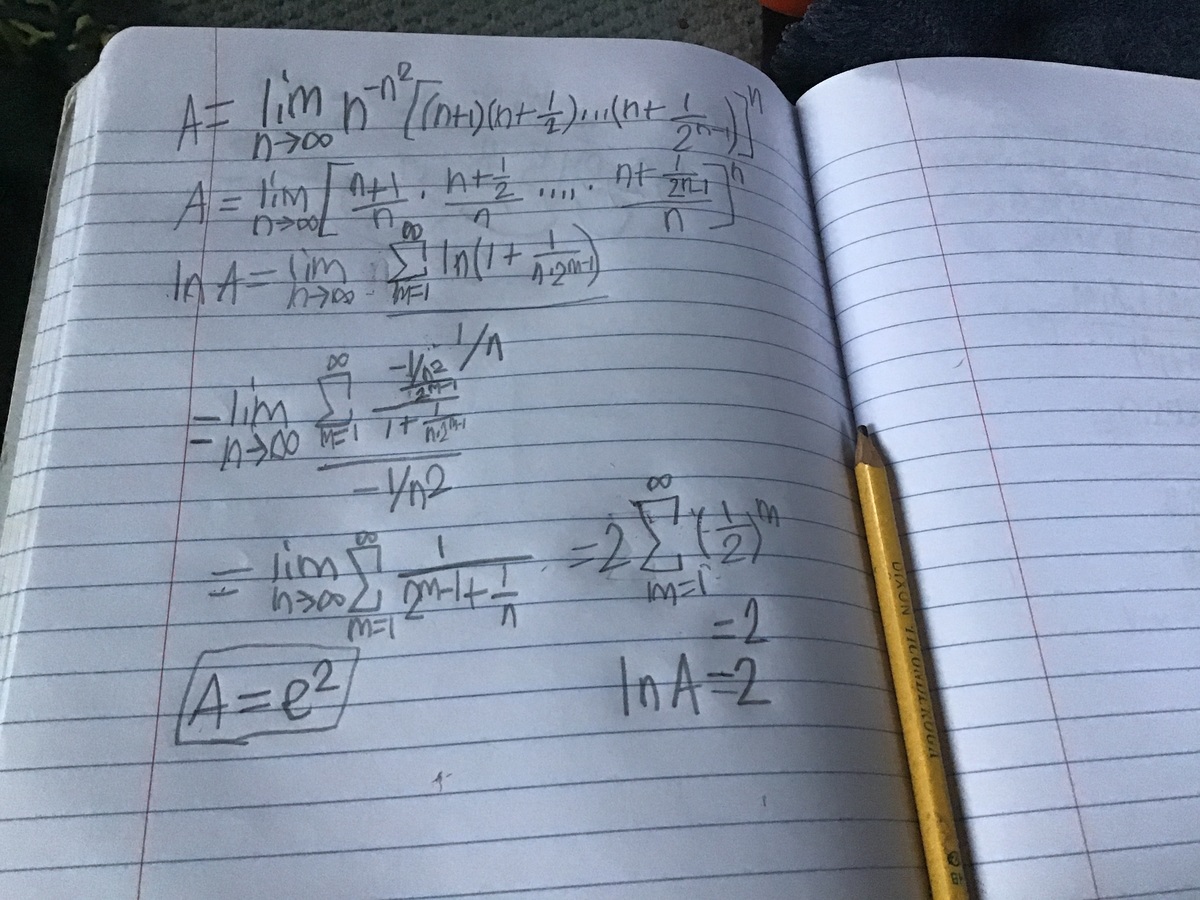Don't Exceed but Evaluate
n → ∞ lim n − n 2 [ ( n + 1 ) ( n + 2 1 ) ( n + 4 1 ) … ( n + 2 n − 1 1 ) ] n
If the above limit equals to α , what is the value of ⌊ 1 0 0 0 α ⌋ ?
The answer is 7389.
This section requires Javascript.
You are seeing this because something didn't load right. We suggest you, (a) try
refreshing the page, (b) enabling javascript if it is disabled on your browser and,
finally, (c)
loading the
non-javascript version of this page
. We're sorry about the hassle.
3 solutions
Nice solution method, Joel. I'm a little concerned about the steps taken to get to the e a 1 result, even though that is indeed to correct result. Another approach would be
lim n → ∞ ( 1 + a n 1 ) n =
lim n → ∞ ( ( 1 + a n 1 ) a n ) a 1 = ( lim n → ∞ ( 1 + a n 1 ) a n ) a 1 .
Now let u = a n . Then u → ∞ as n → ∞ , and so our expression becomes
( lim u → ∞ ( 1 + u 1 ) u ) a 1 = e a 1 .
did the same process....!!!!! ;)
We can rewrite the limit as
exp
n
→
∞
lim
n
k
=
1
∑
n
−
1
ln
(
1
+
n
2
k
1
)
.
Use
ln
(
1
+
x
)
=
x
+
o
(
x
)
(Taylor series around zero), to get
n
k
=
1
∑
n
−
1
ln
(
1
+
n
2
k
1
)
=
(
k
=
1
∑
n
−
1
2
k
1
)
+
o
(
1
)
Then the limit is
e
2
.
EXACTLY the same approach!!!
 I used L'Hopital's rule in step 4, and cancelled -1/n^2 in step 5. floor(1000 * e^2) = 7389
I used L'Hopital's rule in step 4, and cancelled -1/n^2 in step 5. floor(1000 * e^2) = 7389
First lets use the identity n − n 2 = ( n − n ) n then, lim n → ∞ ( n − n ( n + 1 ) ( n + 2 1 ) ( n + 4 1 ) . . . ( n + 2 n − 1 1 ) ) n = lim n → ∞ ( ( 1 + n 1 ) ( 1 + 2 n 1 ) ( 1 + 4 n 1 ) . . . ( 1 + 2 n − 1 n 1 ) ) n = lim n → ∞ ( 1 + n 1 ) n × lim n → ∞ ( 1 + 2 n 1 ) n × lim n → ∞ ( 1 + 4 n 1 ) n × . . .
What is lim n → ∞ ( 1 + a n 1 ) n ?
Simple, lim n → ∞ ( 1 + a n 1 ) n = lim n → ∞ e n ln ( 1 + a n 1 ) = lim n → ∞ e n 1 ln ( 1 + a n 1 ) = lim n → ∞ e − n 2 1 a 1 ( − n 2 1 ) ln ( 1 + a n 1 ) = lim n → ∞ e a 1 ln ( 1 + a n 1 ) = e a 1
So, e 1 e 2 1 e 4 1 . . . = e 1 + 2 1 + 4 1 + . . . = e 2
and e 2 is 7.389... so the answer is 7390.